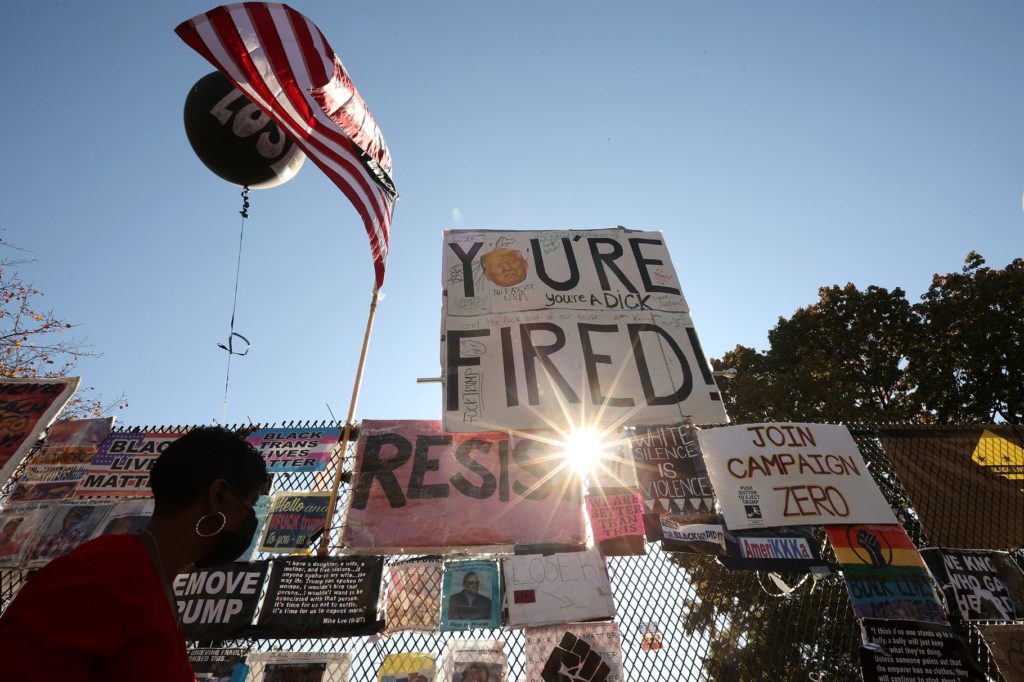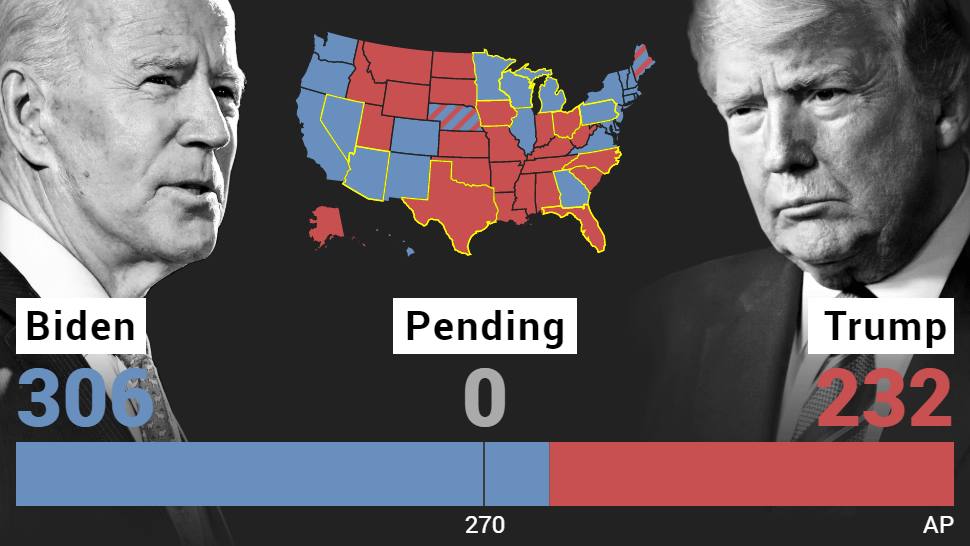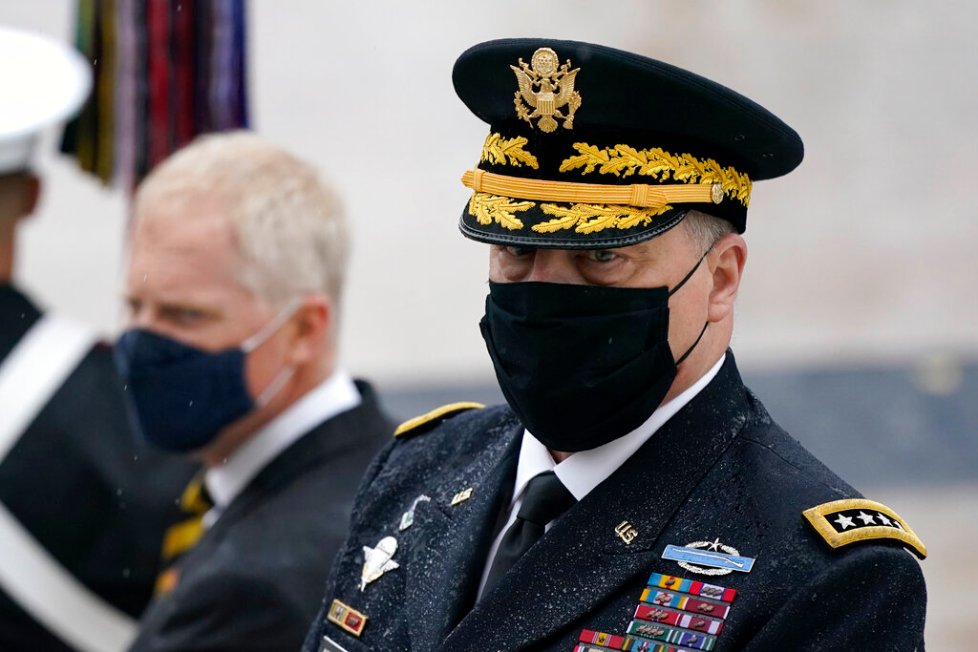Donald Trump has become the first US presidential candidate to ever lose the popular vote twice and the first one-term president of the 21st century.

Instead of accepting his fate though, he is calling election fraud of which no evidence has been found to date. As the Trump administration starts culling top senior defence officials, replacing them with an array of “yes men” you have to wonder, is Donald Trump planning a coup? The British Daily the Guardian asked

Despite President-elect Joe Biden’s election victory Saturday, Trump and several Republican leaders still refuse to acknowledge the win. An awkward moment occurred during a recent press conference when Secretary of State Mike Pompeo seemed to half-joke power wouldn’t pass to Biden.
“There will be a smooth transition to a second Trump administration,” Pompeo said.
Pompeo is the former Director of the CIA, who once told an audience: “We lied, we cheated, we stole. We had entire training courses.” Pompeo has interfered in British politics, telling an audience in New York that the US would not permit a Jeremy Corbyn government .
One of the most abrupt moves the White House has made in recent days was President Trump’s ousting of Defense Secretary Mark Esper, which Trump announced in a tweet on Monday. Trump also replaced the heads of intelligence and policy inside the the Pentagon with Michael Ellis installed as a general counsel of the national security agency, according to the New York Times’ Julian Barnes.
“What Donald Trump is attempting to do has a name: coup d’état,” said Timothy Snyder, a history professor at Yale University specializing in authoritarianism, on Twitter. “Poorly organized though it might seem, it is not bound to fail. It must be made to fail.”
#9: “What Donald Trump is attempting to do has a name: coup d’état. Poorly organized though it is, it is not bound to fail. It must be made to fail.” —@TimothyDSnyder https://t.co/2SZlXOHIaD
— Medium (@Medium) November 13, 2020
Dictatorial tendencies
Trump has long displayed totalitarian characteristics. In February 2016, candidate Trump tweeted a famous quote attributed to Mussolini: “It is better to live one day as a lion than 100 years as a sheep.” Trump encouraged his rally crowds to “knock the crap” out of hecklers, before telling the American public that he welcomes torture on a scale “a hell of a lot worse than waterboarding.”
Gone were the usual Republican dogwhistles. Trump was outright racist and xenophobic: slandering Mexican immigrants as drug-lords and rapists, banning Muslims from several countries from entering the US, separating immigrant and asylum-seeking children from their parents. For two days in August 2017, a Unite the Right rally was held in Charlottesville, Virginia. It was attended by Nazis chanting“Jews will not replace us” and countered by anti-fascists. A young anti-fascist, Heather Heyer, was run over and killed by the white supremacist, James Fields. Trump told reporters that there were “very fine people, on both sides.”
Trump’s racism empowered far-right terrorists in the US. In May this year, Trump tried to designate the anti-fascist, anarchist movement, Antifa, a terrorist organisation. The Regional Organized Crime Information Center of the US Department of Homeland Security (DHS) shared Trump’s view. Secret documents reveal DHS thinks of Antifa and related groups as domestic terrorists. Under Trump, the majority of terror attacks in the US now come from far-right and white supremacist groups.
Far-right proxies
In the US, militias are legal entities that have a right to bear arms. Some are community-defence organisations, like the Puget Sound John Brown Gun Club, named after the abolitionist. These groups seek to repel fascists. Other, more right-leaning militias are not necessarily racist but have a tendency to attract racists. Some admittedly far-right gangs and militias, like the Proud Boys, Boogaloo Bois, and III Percenters, express a range of chauvinistic and bigoted views inspired by Trump. During his first debate with former Vice President Biden, Trump told the Proud Boys: “Stand back and stand by.”
Many took Trump’s comment as an order to wait for further instructions. In October, it was revealed that the private firm Atlas Aegis, staffed mainly by Special Operations veterans of the US Armed Forces, were hired to guard polling stations in Minnesota. A leaked FBI Dallas Field Office report judged that tensions will continue “up to the January 2021 inauguration with the presidential elections acting as a potential flashpoint.” The Boogaloo Bois and other groups “will expand influence … due to the presence of existing anti-government or anti-authority violent extremists.”
An FBI informant recently uncovered a plot by six men linked to a militia called the Wolverine Watchmen, to kidnap the Governor of Michigan, Gretchen Whitmer. The men were reportedly empowered by Trump’s anti-Whitmer rhetoric (“lock her up!”). After the plot was exposed, Trump said: “Maybe it was a problem, maybe it wasn’t.”
The coup unfolds
In the past, candidates who had likely been cheated out of their Presidential victories—from Richard Nixon in 1960 to Al Gore in 2000—conceded for the sake of domestic harmony. Today, Trump and his lawyers are brushing tradition aside.
In August, citing Trump’s repeated refusal to concede and commit to a peaceful transition, should he lose, two retired Army personnel, Officer John Nagl and Lt. Col. Paul Yingling, wrote to the Joint Chiefs of Staff General, Mark Milley, stating: “The president … is actively subverting our electoral system, threatening to remain in office in defiance of our Constitution.” They reminded Milley of his duty to remove Trump by force if necessary. Former White House Communications Director, Anthony Scaramucci, told the media that the Secret Service, a civilian agency, will remove Trump if necessary.
Trump appears to be pre-empting the move.
On the evening of 4th November, as the ballots were still being counted, Trump made an extraordinary statement alleging widespread voter fraud, stating: “We won’t stand for it!” The next day, Trump issued an update, claiming: “As everyone now recognizes, media polling was election interference, in the truest sense of that word, by powerful special interests.” Former New York Mayor and Trump supporter, Rudy Giuliani, attempted to lend credibility to these claims by presenting alleged witnesses to fraud and announcing the Republicans’ intention to file lawsuits.
As media declared Biden the winner before the votes were verified, as is customary, the Democrats were met with silence from Republicans, who normally congratulate the President-elect. Republican Senator, Ted Cruz, appeared on the traditionally pro-Trump (now largely anti-Trump) Fox News to back Trump’s refusal to transition. The turning point came on November 9th, when Senate Majority Leader, Mitch McConnell, told Congress: “President Trump is 100 per cent within his rights to look into allegations of irregularities and weigh his legal options.” On the same day, Attorney General William Barr authorised investigations into irregularities.
Changes at the Pentagon
Pentagon changes

While sacked Defense Secretary, Mark Esper’s expertise included aerial combat. Esper’s replacement, Officer Christopher Miller, has a far more militant, on-the-ground background. His experience includes “Information Operations, unconventional warfare, irregular warfare, direct action, [and] special reconnaissance,” which is concerning given that the US may be on the brink of internal conflict.
After the Acting Under Secretary of Defense for Policy, James Anderson, resigned denouncing Trump’s cronyism, Brig. Gen. Anthony Tata took his place. Like Miller and unlike Anderson, Tata has experience in special operations, which usually involved denying democracy in foreign lands, including: “Operation Uphold Democracy to support Haitian stability, Operation Joint Endeavor in Bosnia and Croatia, Operation Jungle Warrior in Panama, Operation Joint Guardian in Kosovo, and Operation Enduring Freedom in Afghanistan.” Per the K-File report, Tata said Islam was the “most oppressive violent religion I know of” and called Obama a “terrorist leader” who did more to harm the United States “and help Islamic countries than any president in history.”

Commenting on the recent events, former President Bill Clinton’s Secretary of Defense, William Cohen, said of Team Trump: “the way they are conducting themselves is more akin to a dictatorship than a democracy.” Adam Smith, Chair of the House Armed Services committee, says: “It is hard to overstate just how dangerous high-level turnover at the Department of Defense is during a period of presidential transition.” An unnamed official currently working in the Pentagon said: “This is scary, it’s very unsettling … These are dictator moves.”

Houston Chronicle daily talked to University of Houston political science professor Brandon Rottinghaus if it’s possible that Trump is staging a coup and the likelihood of a coup unfolding in America.
Some Americans are concerned that President Trump might stage a “soft coup” after the firing of Pentagon chief Mark Esper. How concerned should Americans be?
Rottinghaus: There’s definitely a danger in making personnel changes with politics only in mind, especially at such a sensitive time in the political transition in this country. It is not a “sky is falling” situation, but it is certainly worrisome that we would put politics with personnel in the national security state. The good news is that there is a larger apparatus around these institutions that protects all of it with a hardened shell. There is a larger thorax around the national security state that can protect changes within it. No one change will completely disrupt the operation of national security.
Does the new shift in power at the Pentagon present a worrisome scenario, regarding military backing President Trump, should he not refuse to leave the White House?
There are multiple fears that people have, because of the unprecedented nature of this. There are firm rules and orderly processes in place that prevent an internal coup from occurring. It would be very difficult to move that forward in any significant way. He may find a handful who would believe and another handful who would go along with it. But the full military industrial complex would not follow such an outrageous tactic.
Any thoughts about the next step in the Trump campaign’s strategy?
I don’t see a real strategy from them. I guess if they had something more organized from them, I would be more worried. But at this point, it’s just grousing, which is just sour grapes in an unbecoming way.
The Guardian, Chron/ Agencies /YL

Leave a Reply
You must be logged in to post a comment.